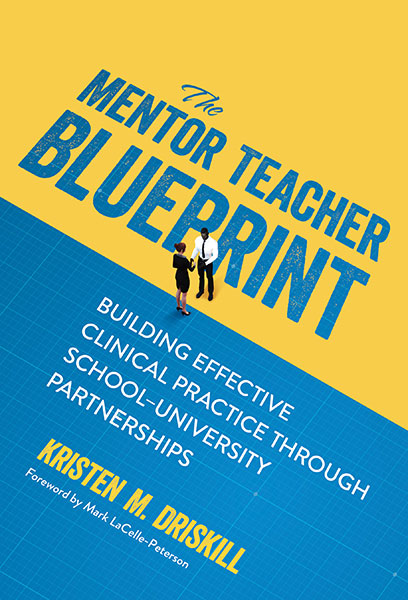Kristen M. Driskill is co-dean of the School of Education and Social Work, chair of the Department of Teacher Education, and associate professor of teacher education at Roberts Wesleyan University. She is the author of The Mentor Teacher Blueprint: Building Effective Clinical Practice Through School–University Partnerships.
The education of future generations is undoubtedly one of the most critical responsibilities in our society. To ensure quality education for all students, we have established stringent standards for teacher preparation programs, including accreditation standards, state teaching standards, and state certification requirements. These standards help maintain a high level of consistency and quality across teacher preparation programs. However, there is an alarming gap in the system: the lack of common standards for mentor teachers who work with teacher candidates. Here, I will explore why common standards for mentor teachers are essential, the current state of mentorship in teacher preparation, and potential solutions to bridge this gap.
The Importance of Mentor Teachers
Research shows that mentor teachers play a critical role in the development of future educators. They serve as guides, role models, and sources of inspiration for teacher candidates. As I discuss in The Mentor Teacher Blueprint (Teachers College Press, 2023), a great mentor teacher can significantly impact a new teacher’s pedagogical skills, content knowledge, and confidence. On the flip side, an ineffective mentor teacher can pave the way for developing poor habits or even dissuading a teacher candidate from persisting in the field. Unfortunately, the absence of common standards for mentor teachers has resulted in inconsistencies in clinical practice, ultimately affecting the quality of education that our P–12 students receive.
The Current State of Mentorship in Teacher Preparation
Clinical practice in teacher preparation programs varies widely across the United States. The lack of common standards for mentor teachers means that these crucial educators may not receive consistent training, support, or evaluation. Some teacher candidates may have excellent clinical experiences due to their mentor teacher, while others may be left without proper guidance and support. This inconsistency creates a significant challenge for teacher preparation overall.
In many cases, mentor teachers are selected based on their seniority and availability, rather than their ability to mentor effectively. While experience is undoubtedly valuable, being an experienced teacher does not automatically make one a great mentor. Mentor teachers must possess a unique skill set that goes beyond classroom management and lesson planning. They need to be able to observe, provide constructive feedback, encourage reflection, and support the growth of teacher candidates. Without common standards, there is no guarantee that mentor teachers possess these crucial skills.
Why It Matters
Here are some reasons why common standards for mentor teachers are essential:
Quality Assurance
Common standards for mentor teachers would serve as a quality assurance mechanism. They would ensure that identified mentor teachers possess the necessary skills to guide teacher candidates effectively and are adequately prepared to do so. This would lead to a more consistent and reliable clinical experience for all aspiring educators.
Improved Teacher Development
With established standards, mentor teachers can receive training and ongoing support to help them excel in their role. This, in turn, would lead to better professional growth for teacher candidates. Well-prepared mentor teachers can help address the challenges faced by new educators, ultimately improving the overall quality of teaching in our schools.
P–12 Student Success
Quality clinical experiences directly impact P–12 student success. Teacher candidates who work with effective mentor teachers are more likely to become competent and confident educators. This, in turn, positively affects the learning outcomes of the P–12 students they teach.
Attraction and Retention
Common standards for mentor teachers could make the role more attractive, leading to more qualified individuals volunteering to serve in the role. It could also encourage experienced educators to stay in the profession longer, as opportunities become more rewarding and well-defined. In addition, schools and districts may be able to better attract and retain new teachers when they provide high-quality clinical experiences for those teacher candidates entering the field.
Potential Solutions
To bridge the gap in standards for mentor teachers, there are several potential solutions that can be explored within school–university partnerships:
National Guidelines
Developing a set of national guidelines for mentor teachers would establish a baseline for mentorship across the country. These guidelines could cover areas such as mentor training, responsibilities, evaluation, and ongoing support. While it is important to give voice to all those involved in teacher preparation, and expectations for clinical practice should be co-constructed within a school-university partnership, a baseline from which to start would be helpful.
Accreditation
Accreditation standards do currently address the involvement of all stakeholders within teacher preparation, which includes mentor teachers. However, it may be beneficial to address expectations for mentor teachers within these standards. Doing so would create an element of accountability to ensure that only those who meet certain standards are eligible to serve in this role.
Mentor Certification
Similar to teacher certification, mentor teachers could be required to obtain a mentor certification, demonstrating their competence in guiding and supporting teacher candidates. A digital badge or microcredential could serve the same purpose.
Professional Development
Mentor teachers should have access to ongoing professional development opportunities. This would help them stay current with best practices and research in education, ensuring that they provide the most up-to-date guidance to teacher candidates.
Collaboration with Teacher Preparation Programs
Teacher preparation programs should work closely with mentor teachers to establish a mutual understanding of expectations, responsibilities, and standards. Collaborative efforts within a school-university partnership can help ensure that the best educators are chosen to work with teacher candidates, are well trained and supported throughout a clinical experience, and are regularly evaluated for effectiveness within clinical practice.
Conclusion
Teacher preparation programs are the foundation of our P–12 education system, and mentor teachers play an integral role in shaping the future of education. While we have established rigorous standards for teacher candidates and their programs, it is high time we address the glaring gap in standards for mentor teachers with whom our teacher candidates work. Common standards or guidelines for mentor teachers are essential to maintain the quality and consistency of clinical experiences, ultimately benefiting teacher candidates and, most importantly, the P–12 students they will one day educate. By developing national guidelines, establishing accreditation and certification processes, and fostering collaboration, we can ensure that mentor teachers are well-equipped to guide the next generation of educators effectively. In doing so, we take a significant step toward elevating the quality of education in our country and securing a brighter future for our students.

The Mentor Teacher Blueprint
Building Effective Clinical Practice Through School–University Partnerships
Kristen M. Driskill
Photo by RDNE Stock project

 By:
By: